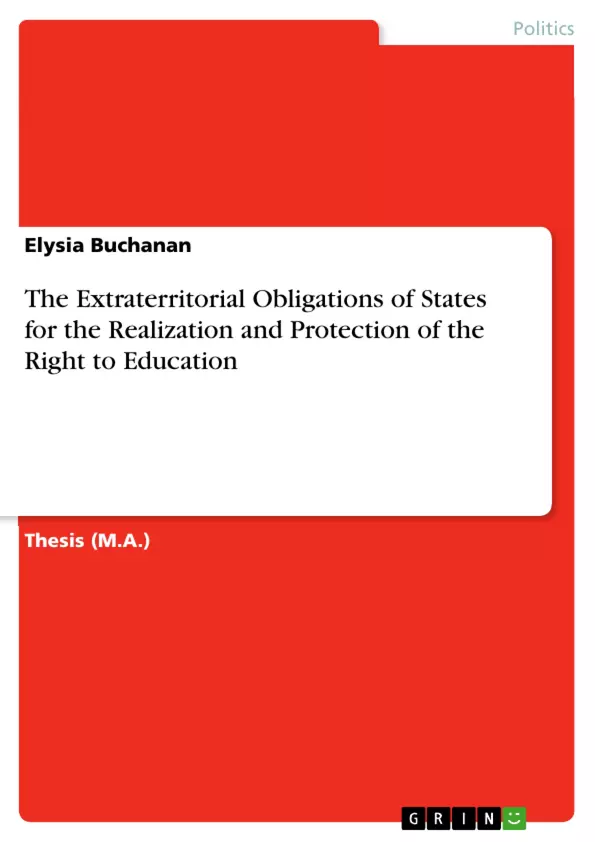
The Extraterritorial Obligations of States for the Realization and Protection of the Right to Education
Magisterarbeit, 2015
51 Seiten, Note: 73.0
Leseprobe
Frequently asked questions
What is the scope of this document?
This document provides a comprehensive language preview, including the title, table of contents, objectives and key themes, chapter summaries, and keywords related to extraterritorial obligations of states regarding the right to education, particularly in emergency situations.
What topics are covered in the table of contents?
The table of contents includes sections on: the definition and scope of the right to education; exploring the extraterritorial obligations of states for the right to education (including obligations to respect, protect, and fulfill); ETOs and the concept of jurisdiction in IHRL; causality, division of responsibility, and other challenges; ETOs for education in emergencies (including International Disaster Response Law and the Right to Education during Armed Conflict); and concluding observations.
What does the document say about the definition and scope of the Right to Education?
The document states that the right to education is an empowerment right and acts as a multiplier for the enjoyment of other fundamental rights. It encompasses not only access but also the elimination of discrimination and setting minimum standards and improving quality. It focuses on articles in the ICESCR and CRC as the most detailed international provisions.
How are Extraterritorial Obligations (ETOs) defined in the document?
Extraterritorial Obligations (ETOs) are defined as obligations relating to the acts and omissions of a State, within or beyond its territory, that affect the enjoyment of human rights outside of that State's territory; and obligations of a global character to take action, separately and jointly through international cooperation, to realize human rights universally.
What challenges are mentioned regarding the framework for Extraterritorial Obligations?
The challenges mentioned include the lack of doctrinal clarity in defining ETOs, practical implications, exact commitments of States, difficulty in holding States accountable, determining causation and responsibility, allocating ETOs across multiple actors, and the complexities involved in implementation.
What aspects of education in emergencies are discussed?
The document discusses ETOs for education in emergencies relating to International Disaster Relief Law (IDRL) and International Humanitarian Law (IHL), with subsections on international disaster response law, the right to education during armed conflict (including special protections, education of interned children, and targeting concerns), and the right to education during occupation.
What acronyms are provided in the document?
Some of the acronyms provided include: 4As (Adaptability, Acceptability, Accessibility, Availability), API (Additional Protocol I), APII (Additional Protocol II), CERD (Convention on the Elimination of Racial Discrimination), CESCR (Committee on Economic, Social and Cultural Rights), CRC (Convention on the Rights of the Child), ETOs (Extraterritorial obligations), and IHL (International Humanitarian Law).
What general state obligations arise from the right to education?
The general state obligations which arise from the right to education are further delineated in light of the tripartite framework to respect, protect and fulfil economic, social and cultural rights (ESCR).
Details
- Titel
- The Extraterritorial Obligations of States for the Realization and Protection of the Right to Education
- Hochschule
- University of Nottingham
- Note
- 73.0
- Autor
- Elysia Buchanan (Autor:in)
- Erscheinungsjahr
- 2015
- Seiten
- 51
- Katalognummer
- V352795
- ISBN (eBook)
- 9783668391536
- ISBN (Buch)
- 9783668391543
- Dateigröße
- 736 KB
- Sprache
- Englisch
- Anmerkungen
- Awarded Distinction
- Schlagworte
- Education Human Rights International Law
- Produktsicherheit
- GRIN Publishing GmbH
- Preis (Ebook)
- US$ 0,99
- Preis (Book)
- US$ 28,99
- Arbeit zitieren
- Elysia Buchanan (Autor:in), 2015, The Extraterritorial Obligations of States for the Realization and Protection of the Right to Education, München, Page::Imprint:: GRINVerlagOHG, https://www.diplomarbeiten24.de/document/352795
- Autor werden
- Ihre Optionen
- Vertriebskanäle
- Premium Services
- Autorenprofil
- Textarten und Formate
- Services für Verlage, Hochschulen, Unternehmen

- © GRIN Publishing GmbH.
- Alle Inhalte urheberrechtlich geschützt. Kopieren und verbreiten untersagt.
- info@grin.com
- AGB
- Open Publishing
Der GRIN Verlag hat sich seit 1998 auf die Veröffentlichung akademischer eBooks und Bücher spezialisiert. Der GRIN Verlag steht damit als erstes Unternehmen für User Generated Quality Content. Die Verlagsseiten GRIN.com, Hausarbeiten.de und Diplomarbeiten24 bieten für Hochschullehrer, Absolventen und Studenten die ideale Plattform, wissenschaftliche Texte wie Hausarbeiten, Referate, Bachelorarbeiten, Masterarbeiten, Diplomarbeiten, Dissertationen und wissenschaftliche Aufsätze einem breiten Publikum zu präsentieren.
Kostenfreie Veröffentlichung: Hausarbeit, Bachelorarbeit, Diplomarbeit, Dissertation, Masterarbeit, Interpretation oder Referat jetzt veröffentlichen!
- GRIN Verlag GmbH
-
- Nymphenburger Str. 86
- 80636
- Munich, Deutschland
- +49 89-550559-0
- +49 89-550559-10
- info@grin.com
-









